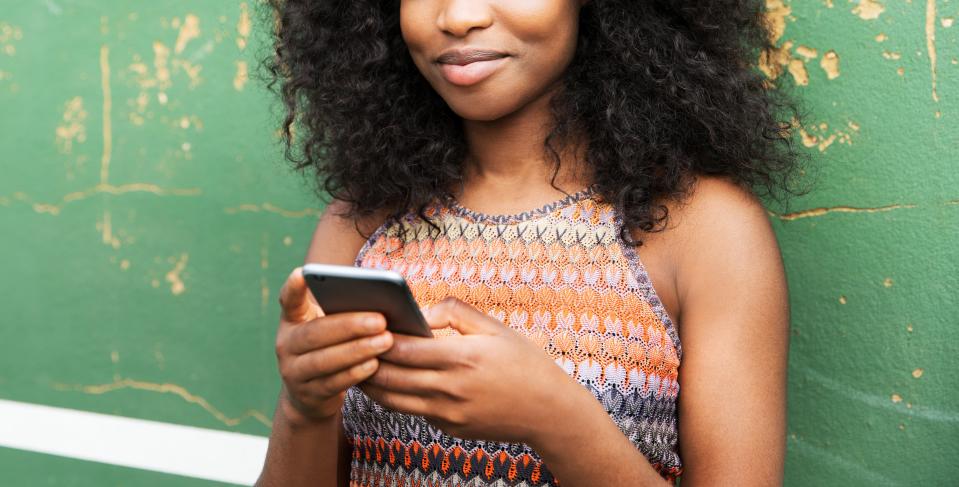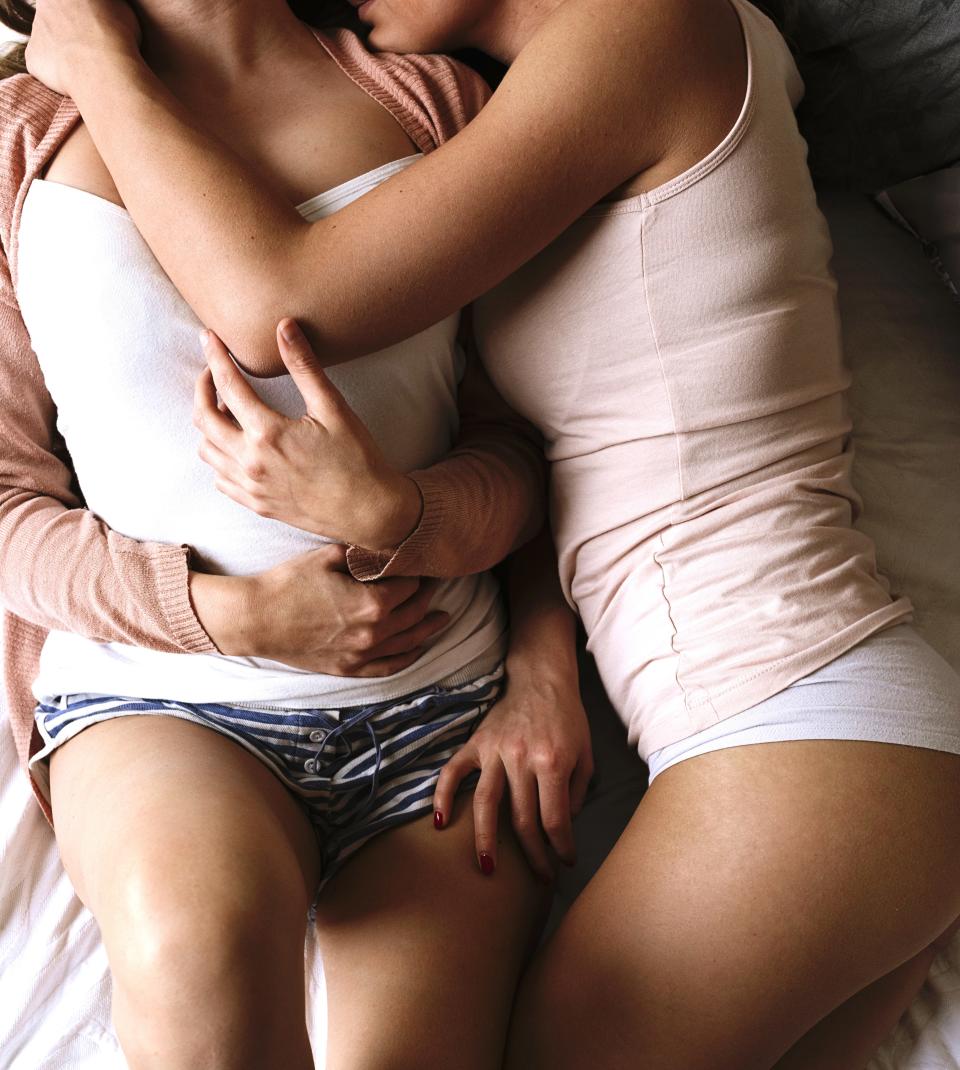Queer Women Like to Fuck, Too — So Why Don't We Have Better Hookup Apps?
Whether you're an appreciator of weed, a hater, or a beard fetishist, there's a dating app out there for you and your specific interests. Online platforms cater to a wide variety of communities with different hobbies, social circles, and relationship styles, and if you're looking for something short-term, there’s always Tinder.
Still, not every community enjoys access to the same range of options. For many LGBTQIA+ people, arranging and navigating hookups poses unique difficulties, especially when the app choices are limited. And while men seeking men can turn to Grindr, Scruff, GROWLr, Jack'd, Hornet, and Chappy, women are missing an app specifically for finding casual sex with other women.
There are a handful of online dating services for lesbian, bi, and queer women, but take it from this queer woman: Sometimes we want to talk for hours with a pretty girl over coffee, and other times, we're just horny. It's true that popular apps like Tinder are open to and used by queer women, but on more mainstream platforms like these, women seeking women may also have to deal with profiles of cis men and opposite-sex couples seeking unicorns for their threesomes. So where's our hookup-focused app? To answer this question, I asked queer sex and relationship experts and potential app users about the barriers standing between us and phone-enabled one-night stands.
The tech space may be overlooking queer communities
According to relationship expert Logan Levkoff, one of the major obstacles keeping potential women-for-women hookup apps off the market may be the traditional app-development model itself, which she says has "created this space where people assume there's not a need for it." Historically, Levkoff explains, a lot of hookup apps have been created and designed through "a fairly male lens" without much room for nuance.
"The tech space is so male-dominated," agrees Dera, a 23-year-old web developer in Berlin, who hypothesizes that entrepreneurs are unlikely to receive venture capital to create a hookup app for queer women. The reason is painfully familiar: Investors, who are often straight and male, don't see the point.
Stereotypes about women and queer women in particular loom large
Misconceptions about queer women's sexuality itself may serve as a barrier to the development of a women-for-women cruising app. As Dera puts it, "People think that queer women don't want casual sex." Sex between women that doesn't exist for men's pleasure or enjoyment may be seen as unimportant or even nonexistent. Pervasive clichés, such as "U-Hauling" (when two women move in together soon after they begin dating) or "lesbian bed death" (the supposed extinction of a same-sex female couple's sex life over a long-term relationship) contribute to the idea that queer women exclusively desire serious relationships and rarely have sex.
People think that queer women don't want casual sex.
The idea that women in general don't enjoy casual or emotionally unattached sex may also contribute to the death of app options, even though it's a misconception. A 2015 study published in the journal Archives of Sexual Behavior indicates that women may desire casual sex just as much as men, while a 2018 study suggests women enjoy casual sex most when they initiate. As Levkoff points out, "Women of all ages and all demographics certainly have the same need and want for connection, and sometimes want sex simply for the sake of sex without anything emotionally attached to it. Everyone is certainly entitled to that."
Apps in general have trouble welcoming all users
Unfortunately, hookup apps often become hostile, alienating online environments. "I would use [an app for queer women] if it were like Grindr, but I would be wary of it," admits Angel, a 22-year-old based in Philadelphia. "Oftentimes bodies like mine — black, fat, not conventionally attractive — aren't seen as desirable, and I'd be very surprised if using an app like that would improve my chances of meeting people...I don't know whether it would be inclusive for all queer femmes, women, and nonbinary people."
Apps like Tinder and OKCupid may be popular among some queer people but aren't friendly to all, Angel says. "There isn't a lot of action. I get radio silence on those apps, except for hateful messages from cis white dudes."
Even queer-focused apps may struggle to create safe spaces
Dating apps specifically for LGBTQ+ women do exist, but few have been as user-friendly or as prevalent in the communities they cater to as apps targeted primarily at straight users, like Tinder. HER is one of the more well-known options on the market for queer women, but the app's relatively low ratings are a turnoff for some. "I never downloaded HER because I saw a 2.6-star review and ran away," Dera says. Others feel the app isn't safe for or welcoming to trans women. "HER is swarming with TERFs [trans exclusionary radical feminists]," says Amanda Rodriguez, a 27-year-old in Oakland, California.
The failure of many hookup apps to navigate gender identity and sexuality with sensitivity can create problematic experiences for users who feel that these apps don't reflect who they are and what they're looking for. "There are so many different categories under that umbrella of being queer — so many amazing categories that coming up with a simple hookup format isn't easy, because it requires more nuance," Levkoff says.

Woman using smart phone next to green wall
Getty ImagesCarolyn Yates, a writer and editor whose work focuses on the intersection of sexuality and culture, agrees that a cruising space looking to cater to a queer community has a lot of questions to answer about inclusivity. She names a few examples: "Where do the lines around that community fall? How do you protect trans women? Do you welcome genderqueer and nonbinary folks and trans men? How do you allow folks of all sexualities and genders to feel seen and validated and included, while also creating a space free from cis straight dudes?"
These considerations are important ones for an platform looking to protect the physical and emotional safety of all of its users. "Usually dating queer, cis women as a trans woman is complicated, so I'd struggle with how to navigate that in a casual hookup app," says 40-year-old Hannah Howard, a computer programmer living in Los Angeles. "Half the women I meet on Tinder already don't bother to read I'm trans, and then find out later and freak out... 'Later' is still before we make it to the bedroom, which is a good thing."
Community size can make sustainability difficult
Regardless of the existence of demand for inclusive hookup apps, some queer communities may be too small to sustain them. "The biggest barrier I've found with queer-aimed distance-based apps is that not enough folks sign up to make it work," says Minneapolis-based cartoonist Archie Bongiovanni, a contributor to queer-women-focused site Autostraddle. "If there are only 12 people in your community on the app that are within 50 miles, it's not going be functional. That's the biggest difference, and why I think folks go back to Tinder over and over."
Yates agrees that the size of communities of queer women also plays a role. "There aren't a lot of us, so it feels more likely that any random stranger on an app will turn out to share three exes with one of your exes," she says. As she points out, casual sex scripts of "let's smash and then not ever see each other again" are admittedly a bit harder to follow when you and your sex partner have only two or three degrees of separation.
Even when interested, queer women may hesitate to seek out casual sex
Yates points out that the lack of an app that functions like Grindr for queer people may have to do with interpersonal patterns: "I wonder if it has less to do with ideas about queer sex and more with how queer women and people approach each other," she says. "We don't have heteronormative scripts to follow, which is great because any interaction can be anything, but bad because any interaction could be anything. There's often a nebulousness — is this a sex date? Romantic date? Friend date? Networking? — which gets even more complicated if you add non-monogamy and kink and alternative relationship styles."
At the same time, Yates admits that this nebulousness "is also sort of freeing, as much as it can be a pain if you're just trying to smash. And I do think women are just trying to smash, there's just a little more to wade through first."
Tinder, along with OKCupid and Bumble, are popular mainstream choices for many queer women and offer woman-for-woman profile settings and filters, but those can be frustrating when you're just trying to smash. "Even on Tinder, you have to wade through so much other stuff if you're just looking for a hookup," Dera says, echoing Yates's assessment. "People on Tinder have 'no [one night stands]' and 'no hookups' on their profiles, which is fine, but some people are just trying to use the app how it was intended. It's stigmatized to say you're there for sex. People will check every box except [the one for casual sex]."
Yates also points out some LGBTQ+ women and people may not feel entirely comfortable using a hookup-focused app. "Queer women and people also have a long history of our desire being stigmatized. There can be a worry that our desire come across as creepy or predatory in some way, even consensually expressed in queer spaces — a little bit because of stigma as well as internalized homophobia, a little bit because of our current broken consent culture, and a little bit because queer women's and people's desire is so often erased that we're not used to seeing anyone express it," she says.
Barriers aside, queer women deserve safe, inclusive apps for casual sex
The lack of queer women's hookup apps points to misunderstandings about women, whether queer, trans, or cis, as well as about nonbinary and gender-nonconforming people. "Queer women and people navigate casual hookups differently, but we also don't have an app for that," Yates says. "And personally, I want one. I'm positive we will see developments in queer dating spaces in the next year or so, and when those come, I sincerely hope there's room for cruising, but I don't think that's all there'll be."
Whether they're swiping for a one-night stand or searching for a long-term partner, most people on online dating and hookup apps are looking for connection and affirmation — of their bodies, sexualities, and desires. The fact is that contrary to many stereotypes, queer women are interested in enjoying casual sex. In an app marketplace that caters to clown lovers, zombie chasers, and even ghosts, we deserve a safe online space where we can find it.
Read more stories about sex and relationships:
How Do I Tell My Partner I Fantasize About My Kink During Sex?
Women Reveal What They Were Thinking the Last Time They Had Sex
Now, watch the evolution of short hairstyles over the past 100 years:


